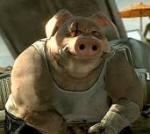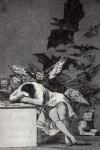Page 1 of 1
Ascendancy, Godhood and the Deck of Dragons Whaaaa?!
#1

Posted 10 October 2010 - 02:32 PM
Right, so this is probably a fairly popular topic to start a thread about, but I couldn't see one so...someone point me in the right direction if I'm wrong.
So after thinking about it this morning, I'm still not quite clear on the difference between ascendancy and godhood and where the boundaries are. From what I can gather, not all ascendants are gods and all gods are ascendants. Anomander Rake and Caladan Brood are ascendants but not gods (right?!) and yet when Kellanved and Dancer ascended, they immediately became gods. Perhaps this is to do with the availability of a realm's throne at the time of ascendancy?
NOW...enter the High Houses of the Deck of Dragons...how does this even work?! All of the positions up for grabs within the Deck, I'd assumed, are claimed by ascendants (some of them being gods, and some of them not) but now that I think about it, that would appear to be wrong - take Kyle, Karsa and Kallor (all these K's!) for example; I thought they were mortal (well OK, Kallor's a bit different in that regard, although he's immortal, he's not an ascendant) and yet they still have places within the Deck.
My question, essentially, is who is able to take a position in the Deck - do they have to be full on gods, or do they even have to have ascended at all? And which positions are 'reserved' for gods, for general ascendants and for mere mortals, as it were, if it even works like that at all?
So after thinking about it this morning, I'm still not quite clear on the difference between ascendancy and godhood and where the boundaries are. From what I can gather, not all ascendants are gods and all gods are ascendants. Anomander Rake and Caladan Brood are ascendants but not gods (right?!) and yet when Kellanved and Dancer ascended, they immediately became gods. Perhaps this is to do with the availability of a realm's throne at the time of ascendancy?
NOW...enter the High Houses of the Deck of Dragons...how does this even work?! All of the positions up for grabs within the Deck, I'd assumed, are claimed by ascendants (some of them being gods, and some of them not) but now that I think about it, that would appear to be wrong - take Kyle, Karsa and Kallor (all these K's!) for example; I thought they were mortal (well OK, Kallor's a bit different in that regard, although he's immortal, he's not an ascendant) and yet they still have places within the Deck.
My question, essentially, is who is able to take a position in the Deck - do they have to be full on gods, or do they even have to have ascended at all? And which positions are 'reserved' for gods, for general ascendants and for mere mortals, as it were, if it even works like that at all?
The love I bear thee can afford no better term than this: thou art a villain.
"Perhaps we think up our own destinies and so, in a sense, deserve whatever happens to us, for not having had the wit to imagine something better." ― Iain Banks
"Perhaps we think up our own destinies and so, in a sense, deserve whatever happens to us, for not having had the wit to imagine something better." ― Iain Banks
#2

Posted 10 October 2010 - 03:36 PM
Spoilers for all books including Dust of Dreams!
Ascendant is a very fluid term. An ascendant is basically a mortal creature that transcends its boundaries and becomes more than what it was, some are pushed into it, some simply grow into the power.
Anomander Rake is worshipped as a god by many Andii and he probably figures into many other cultures myths and pantheons. He just chooses to not acknowledge his worshippers.
When Kel and Dancer ascended they did so with the intent to take the Shadow Realm. As King of the House of Shadow Kel is a God of Shadow. Likewise Cots is now a Shadow God of Assassins. Take have taken up a mantle and fashioned a title for themselves. Brood and Rake for example want no such thing, but then again, they're not exactly wanting in the power department either are they.
You don't need to be an ascendant to have a position in a house. Dassem was a mortal, so was Trull (more or less) and they were both knights. How ever being in a position in a House will push you towards ascendancy eventually.
How ever you also need to remember that a position in a reading does not entitle a position in a house. It simply means that the player is active in the game and he's fullfilling a role in the game that is symbolised by a position in a house. For example Kalam is not actually a part of the House of Death even though the reading in DG suggested that, it just means that his role (delivering the Book of the Apocalypse) will cause a lot of death and destruction.
Kallor can never ascend, not until the curse is lifted.
Karsa's pure stuborness has made him ascend, helped on his way by the Crippled Gods attention.
Likewise Kyle has also been chosen by Osserc but he has yet to get any power upgrades. He merely served as a Herald I'm guessing? transporting Osserc in his sword.
Generally if you're the king, you get all the power of the realm, and you become the focus of all the worshippers and priests. That makes you a god. The rest are just fluctuating positions of varying power. They are most likely always active even if they are not claimed as there is always some body in the world who fulfils a purpose that can be identified with the deck.
 Green Pig, on 10 October 2010 - 02:32 PM, said:
Green Pig, on 10 October 2010 - 02:32 PM, said:
So after thinking about it this morning, I'm still not quite clear on the difference between ascendancy and godhood and where the boundaries are. From what I can gather, not all ascendants are gods and all gods are ascendants. Anomander Rake and Caladan Brood are ascendants but not gods (right?!) and yet when Kellanved and Dancer ascended, they immediately became gods. Perhaps this is to do with the availability of a realm's throne at the time of ascendancy?
Ascendant is a very fluid term. An ascendant is basically a mortal creature that transcends its boundaries and becomes more than what it was, some are pushed into it, some simply grow into the power.
Anomander Rake is worshipped as a god by many Andii and he probably figures into many other cultures myths and pantheons. He just chooses to not acknowledge his worshippers.
When Kel and Dancer ascended they did so with the intent to take the Shadow Realm. As King of the House of Shadow Kel is a God of Shadow. Likewise Cots is now a Shadow God of Assassins. Take have taken up a mantle and fashioned a title for themselves. Brood and Rake for example want no such thing, but then again, they're not exactly wanting in the power department either are they.
 Green Pig, on 10 October 2010 - 02:32 PM, said:
Green Pig, on 10 October 2010 - 02:32 PM, said:
NOW...enter the High Houses of the Deck of Dragons...how does this even work?! All of the positions up for grabs within the Deck, I'd assumed, are claimed by ascendants (some of them being gods, and some of them not) but now that I think about it, that would appear to be wrong - take Kyle, Karsa and Kallor (all these K's!) for example; I thought they were mortal (well OK, Kallor's a bit different in that regard, although he's immortal, he's not an ascendant) and yet they still have places within the Deck.
You don't need to be an ascendant to have a position in a house. Dassem was a mortal, so was Trull (more or less) and they were both knights. How ever being in a position in a House will push you towards ascendancy eventually.
How ever you also need to remember that a position in a reading does not entitle a position in a house. It simply means that the player is active in the game and he's fullfilling a role in the game that is symbolised by a position in a house. For example Kalam is not actually a part of the House of Death even though the reading in DG suggested that, it just means that his role (delivering the Book of the Apocalypse) will cause a lot of death and destruction.
Kallor can never ascend, not until the curse is lifted.
Karsa's pure stuborness has made him ascend, helped on his way by the Crippled Gods attention.
Likewise Kyle has also been chosen by Osserc but he has yet to get any power upgrades. He merely served as a Herald I'm guessing? transporting Osserc in his sword.
 Green Pig, on 10 October 2010 - 02:32 PM, said:
Green Pig, on 10 October 2010 - 02:32 PM, said:
My question, essentially, is who is able to take a position in the Deck - do they have to be full on gods, or do they even have to have ascended at all? And which positions are 'reserved' for gods, for general ascendants and for mere mortals, as it were, if it even works like that at all?
Generally if you're the king, you get all the power of the realm, and you become the focus of all the worshippers and priests. That makes you a god. The rest are just fluctuating positions of varying power. They are most likely always active even if they are not claimed as there is always some body in the world who fulfils a purpose that can be identified with the deck.
#3

Posted 10 October 2010 - 03:52 PM
short hand, the way i see it...
to be a god you have to be worshipped
to be an ascendant you are super powerful with, as apt put it, upgrades
to be part of the deck, you just need to be deemed to be worthy of use
to be a god you have to be worshipped
to be an ascendant you are super powerful with, as apt put it, upgrades
to be part of the deck, you just need to be deemed to be worthy of use
Tehol said:
'Yet my heart breaks for a naked hen.'
#4

Posted 11 October 2010 - 02:18 AM
Ganoes Paran gives a great description of most of this stuff in The BHs. Around page 530 or so mayber... anyway around that part of the book. It details how to become a god and talks about ascendants and all that stuff, so just read that.
Also can it be assumed Karsa is ascended? I would say he has, but i am not 100% sure.
Also can it be assumed Karsa is ascended? I would say he has, but i am not 100% sure.
#5

Posted 11 October 2010 - 09:54 AM
Thanks for the answers. The Deck having no solid rules, as such, makes sense, also I'd forgotten but a god needing to have worshippers is indeed mentioned a few times in RG and I think that's probably the key thing - any ascendant can become a god if they allow themselves to be worshipped.
I'll check out the passage, too.
I'll check out the passage, too.
The love I bear thee can afford no better term than this: thou art a villain.
"Perhaps we think up our own destinies and so, in a sense, deserve whatever happens to us, for not having had the wit to imagine something better." ― Iain Banks
"Perhaps we think up our own destinies and so, in a sense, deserve whatever happens to us, for not having had the wit to imagine something better." ― Iain Banks
#6

Posted 11 October 2010 - 10:14 AM
 Green Pig, on 11 October 2010 - 09:54 AM, said:
Green Pig, on 11 October 2010 - 09:54 AM, said:
Thanks for the answers. The Deck having no solid rules, as such,
Oh I wouldn't say that. It is a magical system. I'm sure it has a well defined set rules to it. We puny mortals are just not capable of comprehending the vastness of the decks influence.
#7

Posted 11 October 2010 - 03:37 PM
Regarding "god". As champoon states, it only indicates you are worshiped and bears no significance to ascendancy and power.
For all intense and purposes Iskaral Pust is a god (to the bhok'arla) and he is neither ascendant or particular powerful (although I'm sure there are arguments against the latter).
For all intense and purposes Iskaral Pust is a god (to the bhok'arla) and he is neither ascendant or particular powerful (although I'm sure there are arguments against the latter).
#8

Posted 12 October 2010 - 03:23 AM
 Beezulbubba, on 11 October 2010 - 03:37 PM, said:
Beezulbubba, on 11 October 2010 - 03:37 PM, said:
Regarding "god". As champoon states, it only indicates you are worshiped and bears no significance to ascendancy and power.
For all intense and purposes Iskaral Pust is a god (to the bhok'arla) and he is neither ascendant or particular powerful (although I'm sure there are arguments against the latter).
For all intense and purposes Iskaral Pust is a god (to the bhok'arla) and he is neither ascendant or particular powerful (although I'm sure there are arguments against the latter).
A very good example. Being a god *may* grant you additional abilities and power, but that requires that your worship be powerful worship. It's all very contextual and case-specific. Shadowthrone is a great example of taking a very powerful role and getting the upgrades that come with it. He took his position of Shadowthrone by planting his but on the Throne of Shadow (one of them, anyhow), and that immediately conferred to him some rule of Shadow, but Shadow and the Empty Throne were already existant and being worshipped in a form (see the Cult of Rashan, the Cult of the Empty Throne, which Kel & Dancer were manipulating before they disappeared). Of course Cotillion on the other hand likely doesn't get much power out of whatever worship he may get, as there's no known former patron for assassins, making the practice relatively new, and as one character points out assassins are not really the type to start zealously worshipping a deity.
But yeah, all very contextual. If there weren't any characters from Cabal we'd never know Icarium is a god.
#9

Posted 28 October 2010 - 08:38 AM
Anomander Rake is an interesting case with regards to his followers at Andara. Rake is an ascendant and god and much more, but he seems to have rejected proper godhood with regards to the Bluerose Andii, or at least refused to fulfill the role they desired he take in their society. Which shows that an ascendant with worshippers can, if strong-willed enough, reject being a god, if a god is, according to this view, to be taken as being an ascendant with followers who actively fulfills a role in their worshippers' lives. Of course, some ascendant aren't so lucky, like Mael, who had to acquire a whole new powerbase to free himself from the influence of his worshippers.
All in all, it's a very nicely nuanced system.
All in all, it's a very nicely nuanced system.
This post has been edited by D'iversify: 28 October 2010 - 08:38 AM
I am the Onyx Wizards
Share this topic:
Page 1 of 1

 Help
Help













